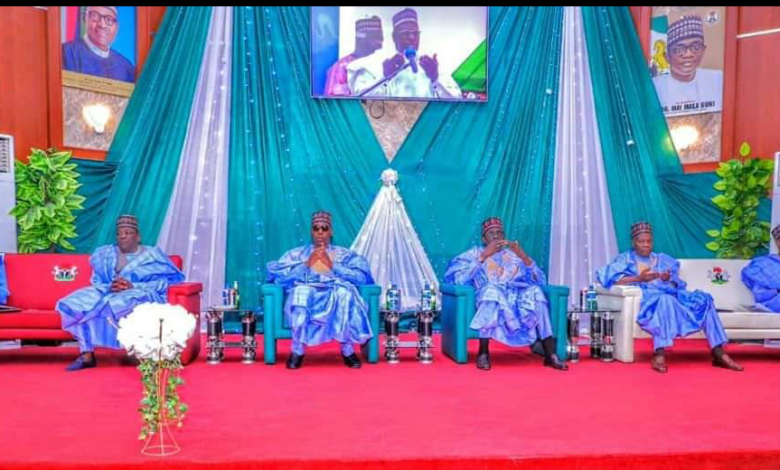Zulum Explains Decision To Ban NGOs From Distributing Relief To Resettled IDPs
Days after he controversially announced the stoppage of food relief distribution to IDP in relocated communities, Governor Zulum justifies why he issued that order

The governor of Borno state, Northeast Nigeria, Babagana Zulum, had today, December 14, 2021, explained why he, last week, banned the distribution of food relief by non-governmental organizations in the five local government areas of the state.
Governor Zulum, who doubles as the chairman of the Northeast Development Forum, made the clarifications during the forum’s meeting in Damaturu, a state in Northeast Nigeria.
The Governor said his decision to stop NGOs from continuing the distribution of food and non-food relief palliatives to internally displaced persons already relocated to their communities was taken following a meeting his forum had with a British High Commissioner to Nigeria, Catriona Laing, when she attended their last meeting in Taraba state.
The directive banning deployment of food relief by NGOs to the “resettled communities” had sparked global reaction with concerned stakeholders questioning the idea, with many fearing it could be counterproductive, especially as it came amidst ongoing hostility between troops and the insurgents.
Camilla Corradin, spokeswoman for the Nigeria INGO Forum had in AFP report published by the Guardian commented on the issue while stressing the fact that “Food security and nutrition indicators across Borno state remain a major source of concern.”
“We call on all actors to ensure that, while self-reliance can be developed, food and other relevant humanitarian assistance can continue to reach those in need…If access to life-saving support is not sufficiently scaled up, the UN warned in October, another 13,551 people are anticipated to experience catastrophe-like conditions.”
To demonstrate the irreversibility of the order, Governor Zulum had, while delivering his opening speech at the Northeast Governor’s Forum Meeting, said the ban was in line with the region’s commitment to transiting the people affected by the conflict from dependency to self-reliance.
“Your Excellencies may recall that the British High Commission to Nigeria, Her Excellency Katrina Lan, was with us at the Forum’s last meeting in Jalingo, Taraba state, to support the regional process of transiting from dependence on humanitarian assistance to socioeconomic self-reliance,” he said.
He added that “it is in line with this principle that only last week I ordered the ban on distribution of food and non-food items in resettled communities in Borno state to further emphasize the significance of self-reliance.
The Governor told his colleagues that by that, and other related actions, they are “indeed on the right track because the forum had since its inauguration made “considerable progress in their collective efforts to bring about viable and sustainable peace and development in our subregion.”
Governor Zulum said what they require to succeed “in this direction” is for the subregional leaders to have a collective resolve and “total commitment to the goals and objectives we have set for ourselves.”
On the issue of the persistent insecurity in the subregion, the governor said “recent developments seemed to have indicated that we have reached the beginning of the end of the insurgency.”
That, he said, could be justified by the recent mass voluntary surrendering by the Boko Haram terrorists.
He added that after “sufficient consultation” with the military and other security agencies, the forum had come up with “some strategic initiatives to exploit the situation.”
“We deliberately made the insurgents believe that surrender was the only responsible cause of action available to them in the face of a devastating onslaught by our troops…and so far thousands of Boko Haram insurgents have surrendered and we are in the process of profiling them.
He, however, called on the Nigerian military not to relent by this action but “ensure that they reach the enclaves of the insurgents.”
“We must pursue them because the nexus between security and development need not be overemphasized. Therefore, we shall do everything possible to ensure this insurgency is brought to an end.”
He states for the government to decimate the insurgents, “it is strategically imperative for our military to consider the kinetic approach in the warfare so that the belligerent remnants of the insurgents would be pursued to their enclaves and destroyed once and for all along with their logistics and infrastructure.”
“Without sustainable security in our region, nothing tangible can be achieved,” he said.
Earlier, the host —Governor of Yobe state, Mai-Mala Buni — had in his welcome address emphasized the need for the region to strategize on its security architecture to defeat Boko Haram.
Support Our Journalism
There are millions of ordinary people affected by conflict in Africa whose stories are missing in the mainstream media. HumAngle is determined to tell those challenging and under-reported stories, hoping that the people impacted by these conflicts will find the safety and security they deserve.
To ensure that we continue to provide public service coverage, we have a small favour to ask you. We want you to be part of our journalistic endeavour by contributing a token to us.
Your donation will further promote a robust, free, and independent media.
Donate HereStay Closer To The Stories That Matter




